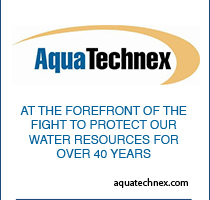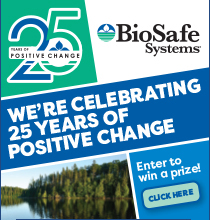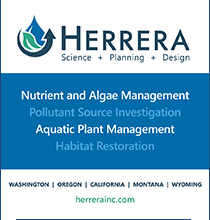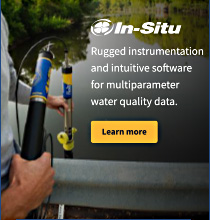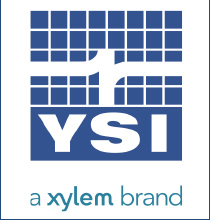by Geri Guinn, President, Diamond Lake Improvement Association (Pend Oreille County)
In the summer of 2009, one of the directors of our association returned from a trip back East and reported her experience at Lake Ontario where she had to wear shoes on the beach and in the water thanks to the infestation of zebra mussels. This sparked our interest and the Diamond Lake Improvement Association (DLIA) started researching quagga/zebra mussels.
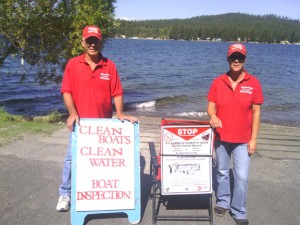
Lyle Libbert and Rebecca Revard serve as full-time lake hosts at Diamond Lake.
Initially the information overwhelmed us, but we knew we had to do something quickly to prevent infestation in our lake. Our mission is “To protect and preserve the water, and enhance the quality of life on Diamond Lake through planning, visionary leadership and dedicated volunteers for the benefit of current and future generations.” Clearly, preventing zebra and quagga mussel infestation and controlling milfoil and other aquatic invasives were part of that mission. We have one public boat launch, so that seemed the logical place to focus our efforts.
We contacted local and state agencies for help but most did not understand what we were trying to do. Our Noxious Weed Board, knowing the urgency of the situation, jumped in to help and in September, 2009, we wrote a grant to the Department of Ecology requesting $73,000 to implement an inspection, education and hot water wash station at Diamond Lake’s boat launch. Unfortunately, DLIA had no grant writing experience and we were denied the grant. Interestingly, one of the reasons DOE gave for turning down our proposal was that quagga/zebra mussels were not considered an invasive threat, and that we did not need a hot water wash station just to control milfoil. My, how things have changed in three years!
Initially we had challenges working with the Washington Department of Fish & Wildlife (WDFW) too. They are an invaluable agency and the local agents are wonderful to work with but we had problems getting written permission for our inspection station at a state boat launch. Since our wash station would take up part of the upper parking lot and would impact recreational use, it could not be approved. We held several meetings, wrote letters to our representatives and after two years got approval for our proposal except for using a vegetative swale for wash station runoff. With the help of DOE’s Michael Hepp, we found that the BMPS Manual does permit small discharges to a grassy area and so we were truly ready to start our operation!
Mike Wilkinson with WDFW came out to the lake and trained more than 30 lake residents in the inspection process. Our lake hosts park their RV at the launch and inspect full time Wednesday through Monday. On Tuesdays and Wednesdays, volunteers take over during the busy times and are also available to help during the busy holidays. Volunteers are the heart and soul of the program and are getting to be well-known around the area with their red polo shirts and baseball caps with the “Clean Boats Clean Waters” logo. They get to keep these and wear them whenever they do inspections and host meetings to promote the program.
We decided not to invest the thousands of dollars that would be needed for a hot water power washer since we are not qualified to and do not intend to decontaminate boats with mussels. If we ever come upon a mussel-infested boat, we will contact the Sheriff and WDFW immediately. Instead, we purchased a small trailer and a generous resident donated a power washer with a 200 gallon tank that we can move easily when we need to. Otherwise it stays parked next to the lake hosts’ RV.
On Opening Day, 2012, Diamond Lake Clean Boats Clean Waters inspected its first boat entering Diamond Lake. That day we inspected more than 40 boats. Folks were very cooperative. We greeted them, told them we were from DLIA, and that we were hoping to do a voluntary inspection for aquatic invasive species (AIS). Most are aware of invasives, but we have pamphlets and samples for educating those new to the issue. We hope not only to prevent boats from entering our lake with AIS, but also to educate boaters about the dangers and how they can prevent transportation of AIS from one body of water to another. (Private launches on the lake have been notified to have boats inspected before allowing a launch, and DLIA has offered help locking and securing private launches if necessary.)
The inspection takes only a couple of minutes. After determining the last body of water the vessel visited, we record the registration number of the boat and compare the state with the vehicle license. Any license or registration from a state other than Washington, Oregon or Idaho warrants an extra-careful inspection since those are the only states that are mussel-free. A quick yet thorough examination of the vessel, and the boater is ready to launch. We have inspected more than 100 boats on a busy weekend. We have only found and washed a few boats due to attached weeds; no mussels have been found.
Pend Oreille County Sheriff’s Department has been extremely supportive of our program. We share information with them and they often drive through the launch. They inspect boats for registrations and safety regulations on almost a weekly basis. This shows boaters how serious DLIA is about keeping our waters safe and clean. Although we have no enforcement power, we know that if we ever have a real problem, one call will have our deputies involved immediately.
WDFW has approved a renovation of our dilapidated launch this fall. Our permission to operate the inspection/education/wash station was given on a trial basis for 2012, but we will request approval for operation in 2013 and expect to receive it. We will pay our annual $250 special use permit fee to the County again to proceed with our lake protection program.
After almost three years and hundreds of hours of research, writing, investigation, training, and fighting, we have completed our first Clean Boats Clean Waters season on Diamond Lake. Thanks to Wisconsin and Michigan for sharing their proven methods for the program. The residents at Diamond Lake are committed to protecting and preserving our beautiful waters and are willing to work hard to accomplish this. We hope to improve our program each season and continue to educate visitors and residents to protect our waters.



